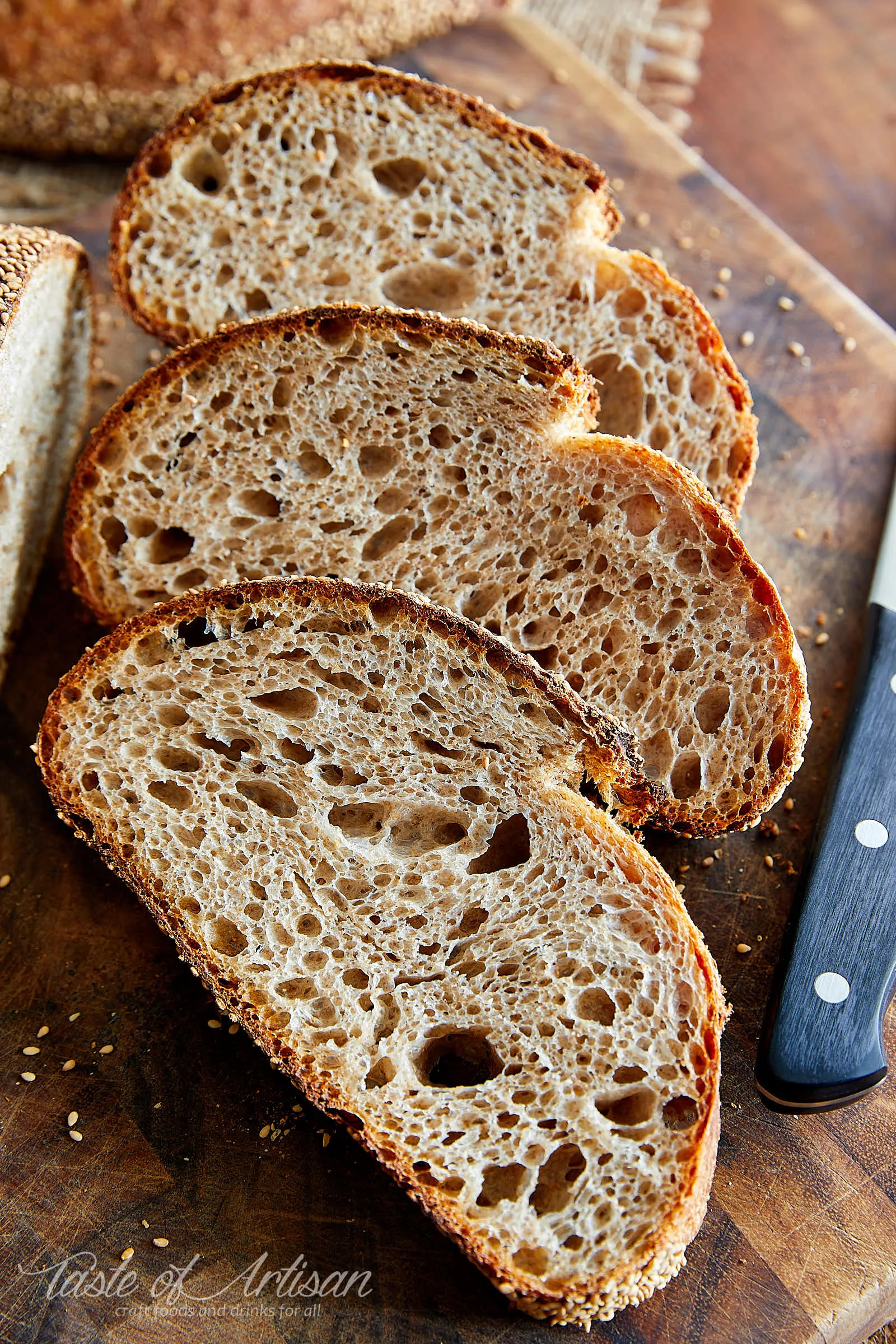Imagine pulling a perfectly crusty, golden-brown loaf of whole wheat sourdough out of your oven, filling your kitchen with an irresistible aroma that transports you to a rustic European bakery. This isn't just bread - it's a labor of love, a culinary masterpiece that combines ancient baking techniques with the wholesome goodness of whole wheat. Whether you're a seasoned baker or a curious kitchen adventurer, this artisan sourdough recipe will transform your home into a professional bakery and elevate your bread-making skills to new heights!
Prep Time: 12 hrs
Cook Time: 40 mins
Total Time: 12 hrs 40 mins
Cuisine: Artisan
Serves: 1 loaf
Ingredients
- 500g whole wheat flour
- 100g sourdough starter
- 350g water
- 10g salt
Instructions
- In a large mixing bowl, combine 500g of whole wheat flour and 10g of salt. Mix well to ensure the salt is evenly distributed throughout the flour.
- In a separate bowl, mix 100g of sourdough starter with 350g of lukewarm water. Stir until the starter is fully dissolved in the water.
- Pour the water and starter mixture into the bowl with the flour and salt. Using your hands or a wooden spoon, mix until a shaggy dough forms. Ensure that all the flour is incorporated, but do not overmix.
- Cover the bowl with a damp cloth or plastic wrap and let it rest for about 30 minutes. This process is known as autolyse and helps to hydrate the flour.
- After the autolyse, perform a series of stretch and folds to develop gluten. Wet your hands to prevent sticking, then grab one side of the dough, stretch it up, and fold it over the center. Rotate the bowl a quarter turn and repeat this process until you have stretched and folded the dough four times.
- Cover the bowl again and let the dough rise at room temperature for about 4 to 6 hours, or until it has doubled in size. During this time, perform additional stretch and folds every 30 minutes for the first 2 hours.
- Once the dough has risen, gently turn it out onto a lightly floured surface. Shape the dough into a round loaf by folding the edges towards the center and then flipping it over so the seam is on the bottom.
- Place the shaped dough into a well-floured proofing basket or bowl. Cover it with a damp cloth and let it rise for another 1 to 2 hours, or until it has puffed up noticeably.
- Preheat your oven to 450°F (232°C) about 30 minutes before baking. If you have a Dutch oven, place it in the oven to preheat as well.
- Once the dough has risen, carefully turn it out onto a piece of parchment paper. Score the top with a sharp knife or a bread lame to allow for expansion during baking.
- Using oven mitts, carefully remove the hot Dutch oven from the oven. Lift the parchment paper with the dough and place it into the Dutch oven. Cover with the lid.
- Bake the bread covered for 30 minutes. Then, remove the lid and bake for an additional 10 to 15 minutes, or until the crust is deep golden brown and the internal temperature reaches around 200°F (93°C).
- Once baked, carefully remove the bread from the Dutch oven and let it cool on a wire rack for at least 1 hour before slicing. This cooling period allows the crumb to set properly.
Tips
- Temperature Matters: Keep your dough in a warm, draft-free area during fermentation. Ideal room temperature is around 70-75°F for optimal rising.
- Patience is Key: Sourdough is not a rushed process. The long fermentation develops complex flavors and improves digestibility.
- Hydration is Critical: Use a kitchen scale for precise measurements to maintain the right dough consistency.
- Learn to Read Your Dough: The stretch and fold technique is more about feel than strict timing. Watch how the dough becomes smoother and more elastic.
- Invest in Good Tools: A Dutch oven, proofing basket, and sharp scoring knife can dramatically improve your bread's texture and appearance.
- Experiment with Flour: While this recipe uses whole wheat, don't be afraid to blend different flour types for unique flavors and textures.
- Store Your Sourdough Starter Properly: Keep it fed and refrigerated between baking sessions to maintain its health and vigor.
Nutrition Facts
Calories: 230kcal
Carbohydrates: g
Protein: g
Fat: g
Saturated Fat: g
Cholesterol: 0mg

